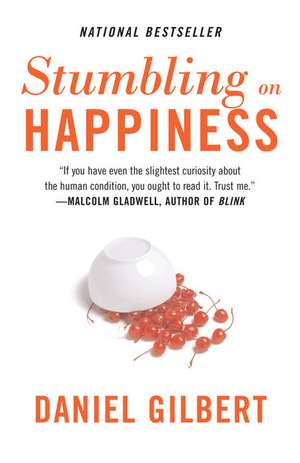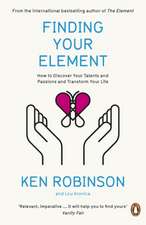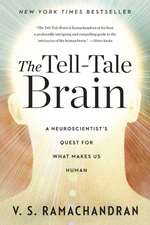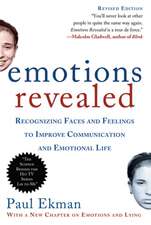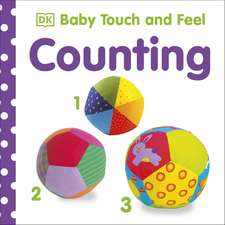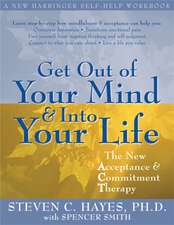Stumbling on Happiness
Autor Daniel Gilberten Limba Engleză Paperback – 28 feb 2007
Vezi toate premiile Carte premiată
• Why are lovers quicker to forgive their partners for infidelity than for leaving dirty dishes in the sink?• Why will sighted people pay more to avoid going blind than blind people will pay to regain their sight? • Why do dining companions insist on ordering different meals instead of getting what they really want? • Why do pigeons seem to have such excellent aim; why can’t we remember one song while listening to another; and why does the line at the grocery store always slow down the moment we join it?In this brilliant, witty, and accessible book, renowned Harvard psychologist Daniel Gilbert describes the foibles of imagination and illusions of foresight that cause each of us to misconceive our tomorrows and misestimate our satisfactions. Vividly bringing to life the latest scientific research in psychology, cognitive neuroscience, philosophy, and behavioral economics, Gilbert reveals what scientists have discovered about the uniquely human ability to imagine the future, and about our capacity to predict how much we will like it when we get there. With penetrating insight and sparkling prose, Gilbert explains why we seem to know so little about the hearts and minds of the people we are about to become.
| Toate formatele și edițiile | Preț | Express |
|---|---|---|
| Paperback (2) | 69.89 lei 3-5 săpt. | +10.08 lei 7-13 zile |
| HarperCollins Publishers – 4 feb 2007 | 69.89 lei 3-5 săpt. | +10.08 lei 7-13 zile |
| Vintage Publishing – 28 feb 2007 | 96.30 lei 3-5 săpt. | +26.62 lei 7-13 zile |
Preț: 96.30 lei
Nou
18.43€ • 19.24$ • 15.25£
Carte disponibilă
Livrare economică 15-29 martie
Livrare express 01-07 martie pentru 36.61 lei
Specificații
ISBN-10: 1400077427
Pagini: 336
Dimensiuni: 133 x 203 x 19 mm
Greutate: 0.24 kg
Editura: Vintage Publishing
Colecția Vintage Books
Notă biografică
Extras
O, that a man might know The end of this day’s business ere it come! Shakespeare, Julius Caesar Priests vow to remain celibate, physicians vow to do no harm, and letter carriers vow to swiftly complete their appointed rounds despite snow, sleet, and split infinitives. Few people realize that psychologists also take a vow, promising that at some point in their professional lives they will publish a book, a chapter, or at least an article that contains this sentence: “The human being is the only animal that . . .” We are allowed to finish the sentence any way we like, of course, but it has to start with those eight words. Most of us wait until relatively late in our careers to fulfill this solemn obligation because we know that successive generations of psychologists will ignore all the other words that we managed to pack into a lifetime of well-intentioned scholarship and remem- ber us mainly for how we finished The Sentence. We also know that the worse we do, the better we will be remembered. For instance, those psychologists who finished The Sentence with “can use language” were particularly well remembered when chimpanzees were taught to communicate with hand signs. And when researchers discovered that chimps in the wild use sticks to extract tasty ter- mites from their mounds (and to bash one another over the head now and then), the world suddenly remembered the full name and mailing address of every psychologist who had ever finished The Sentence with “uses tools.” So it is for good reason that most psychologists put off completing The Sentence for as long as they can, hoping that if they wait long enough, they just might die in time to avoid being publicly humiliated by a monkey.
I have never before written The Sentence, but I’d like to do so now, with you as my witness. The human being is the only animal that thinks about the future. Now, let me say up front that I’ve had cats, I’ve had dogs, I’ve had gerbils, mice, goldfish, and crabs (no, not that kind), and I do recognize that nonhuman animals often act as though they have the capacity to think about the future. But as bald men with cheap hairpieces always seem to forget, act- ing as though you have something and actually having it are not the same thing, and anyone who looks closely can tell the difference. For example, I live in an urban neighborhood, and every autumn the squirrels in my yard (which is approximately the size of two squirrels) act as though they know that they will be unable to eat later unless they bury some food now. My city has a relatively well-educated citizenry, but as far as anyone can tell its squirrels are not particularly distinguished. Rather, they have regular squirrel brains that run food-burying programs when the amount of sun- light that enters their regular squirrel eyes decreases by a critical amount. Shortened days trigger burying behavior with no intervening contemplation of tomorrow, and the squirrel that stashes a nut in my yard “knows” about the future in approximately the same way that a falling rock “knows” about the law of gravity—which is to say, not really. Until a chimp weeps at the thought of growing old alone, or smiles as it contemplates its summer vacation, or turns down a taffy apple because it already looks too fat in shorts, I will stand by my version of The Sentence. We think about the future in a way that no other animal can, does, or ever has, and this simple, ubiquitous, ordinary act is a defining feature of our humanity.
The Joy of Next
If you were asked to name the human brain’s greatest achievement, you might think first of the impressive artifacts it has produced—the Great Pyramid of Giza, the International Space Station, or perhaps the Golden Gate Bridge. These are great achievements indeed, and our brains deserve their very own ticker-tape parade for producing them. But they are not the greatest. A sophisticated machine could design and build any one of these things because designing and building require knowledge, logic, and patience, of which sophisticated machines have plenty. In fact, there’s really only one achievement so remarkable that even the most sophisticated machine cannot pretend to have accomplished it, and that achievement is conscious experience. Seeing the Great Pyramid or remembering the Golden Gate or imagining the Space Station are far more remarkable acts than is building any one of them. What’s more, one of these remarkable acts is even more remarkable than the others. To see is to experience the world as it is, to remember is to experience the world as it was, but to imagine—ah, to imagine is to experience the world as it isn’t and has never been, but as it might be. The greatest achievement of the human brain is its ability to imagine objects and episodes that do not exist in the realm of the real, and it is this ability that allows us to think about the future. As one philosopher noted, the human brain is an “anticipation machine,” and “making future” is the most important thing it does.
But what exactly does “making future” mean? There are at least two ways in which brains might be said to make future, one of which we share with many other animals, the other of which we share with none. All brains—human brains, chimpanzee brains, even regular food-burying squirrel brains—make predictions about the immediate, local, personal, future. They do this by using information about current events (“I smell something”) and past events (“Last time I smelled this smell, a big thing tried to eat me”) to anticipate the event that is most likely to happen to them next (“A big thing is about to ———”). ut notice two features of this so-called prediction. First, despite the comic quips inside the parentheses, predictions such as these do not require the brain making them to have anything even remotely resembling a conscious thought. Just as an abacus can put two and two together to produce four without having thoughts about arithmetic, so brains can add past to present to make future without ever thinking about any of them. In fact, it doesn’t even require a brain to make predictions such as these. With just a little bit of training, the giant sea slug known as Aplysia parvula can learn to predict and avoid an electric shock to its gill, and as anyone with a scalpel can easily demonstrate, sea slugs are inarguably brainless. Computers are also brainless, but they use precisely the same trick the sea slug does when they turn down your credit card because you were trying to buy dinner in Paris after buying lunch in Hoboken. In short, machines and invertebrates prove that it doesn’t take a smart, self-aware, conscious, brain to make simple predictions about the future.
The second thing to notice is that predictions such as these are not particularly far-reaching. They are not predictions in the same sense that we might predict the annual rate of inflation, the intellectual impact of postmodernism, the heat death of the universe, or Madonna’s next hair color. Rather, these are predictions about what will happen in precisely this spot, precisely next, to precisely me, and we call them predictions only because there is no better word for them in the English language. But the use of that term—with its inescapable connotations of calculated, thoughtful reflection about events that may occur anywhere, to anyone, at any time—risks ob- scuring the fact that brains are continuously making predictions about the immediate, local, personal, future of their owners without their owners’ awareness. Rather than saying that such brains are predicting, let’s say that they are nexting.
Yours is nexting right now. For example, at this moment you may be consciously thinking about the sentence you just read, or about the key ring in your pocket that is jammed uncomfortably against your thigh, or about whether the War of 1812 really deserves its own overture. Whatever you are thinking, your thoughts are surely about something other than the word with which this sentence will end. But even as you hear these very words echoing in your very head, and think whatever thoughts they inspire, your brain is using the word it is reading right now and the words it read just before to make a reasonable guess about the identity of the word it will read next, which is what allows you to read so fluently. Any brain that has been raised on a steady diet of film noir and cheap detective novels fully expects the word night to follow the phrase It was a dark and stormy, and thus when it does encounter the word night, it is especially well prepared to digest it. As long as your brain’s guess about the next word turns out to be right, you cruise along happily, left to right, left to right, turning black squiggles into ideas, scenes, characters, and concepts, blissfully unaware that your nexting brain is predicting the future of the sentence at a fantastic rate. It is only when your brain predicts badly that you suddenly feel avocado.
That is, surprised. See?
Now, consider the meaning of that brief moment of surprise. Surprise is an emotion we feel when we encounter the unexpected—for example, thirty-four acquaintances in paper hats standing in our living room yelling “Happy birthday!” as we walk through the front door with a bag of groceries and a full bladder—and thus the occurrence of surprise reveals the nature of our expectations. The surprise you felt at the end of the last paragraph reveals that as you were reading the phrase it is only when your brain predicts badly that you suddenly feel . . . , your brain was simultaneously making a reasonable prediction about what would happen next. It predicted that sometime in the next few milliseconds your eyes would come across a set of black squiggles that encoded an English word that described a feeling, such as sad or nauseous or even surprised. Instead, it encountered a fruit, which woke you from your dogmatic slumbers and revealed the nature of your expectations to anyone who was watching. Surprise tells us that we were expecting something other than what we got, even when we didn’t know we were expecting anything at all.
Because feelings of surprise are generally accompanied by reactions that can be observed and measured—such as eyebrow arch- ing, eye widening, jaw dropping, and noises followed by a series of exclamation marks—psychologists can use surprise to tell them when a brain is nexting. For example, when monkeys see a researcher drop a ball down one of several chutes, they quickly look to the bottom of that chute and wait for the ball to reemerge. When some experimental trickery causes the ball to emerge from a different chute than the one in which it was deposited, the monkeys display surprise, presumably because their brains were nexting. Human babies have similar responses to weird physics. For example, when babies are shown a video of a big red block smashing into a little yellow block, they react with indifference when the little yellow block instantly goes careening off the screen. But when the little yellow block hesitates for just a moment or two before careening away, babies stare like bystanders at a train wreck—as though the delayed careening had violated some prediction made by their nexting brains. Studies such as these tell us that monkey brains “know” about gravity (objects fall down, not sideways) and that baby human brains “know” about kinetics (moving objects transfer energy to stationary objects at precisely the moment they contact them and not a few seconds later). But more important, they tell us that monkey brains and baby human brains add what they already know (the past) to what they currently see (the present) to predict what will happen next (the future). When the actual next thing is different from the predicted next thing, monkeys and babies experience surprise.
Our brains were made for nexting, and that’s just what they’ll do. When we take a stroll on the beach, our brains predict how stable the sand will be when our foot hits it, and then adjust the tension in our knee accordingly. When we leap to catch a Frisbee, our brains predict where the disc will be when we cross its flight path, and then bring our hands to precisely that point. When we see a sand crab scurry behind a bit of driftwood on its way to the water, our brains predict when and where the critter will reappear, and then direct our eyes to the precise point of its reemergence. These predictions are remarkable in both the speed and accuracy with which they are made, and it is difficult to imagine what our lives would be like if our brains quit making them, leaving us completely “in the moment” and unable to take our next step. But while these automatic, continuous, nonconscious predictions of the immediate, local, personal, future are both amazing and ubiquitous, they are not the sorts of predictions that got our species out of the trees and into dress slacks. In fact, these are the kinds of predictions that frogs make without ever leaving their lily pads, and hence not the sort that The Sentence was meant to describe. No, the variety of future that we human beings manufacture—and that only we manufacture—is of another sort entirely.
From the Hardcover edition.
Recenzii
Descriere
Using cutting-edge research, Harvard psychologist Gilbert shakes, cajoles, persuades, and tricks readers into accepting the fact that happiness is not really what or where it is imagined to be.
Premii
- Books for a Better Life Finalist, 2006
